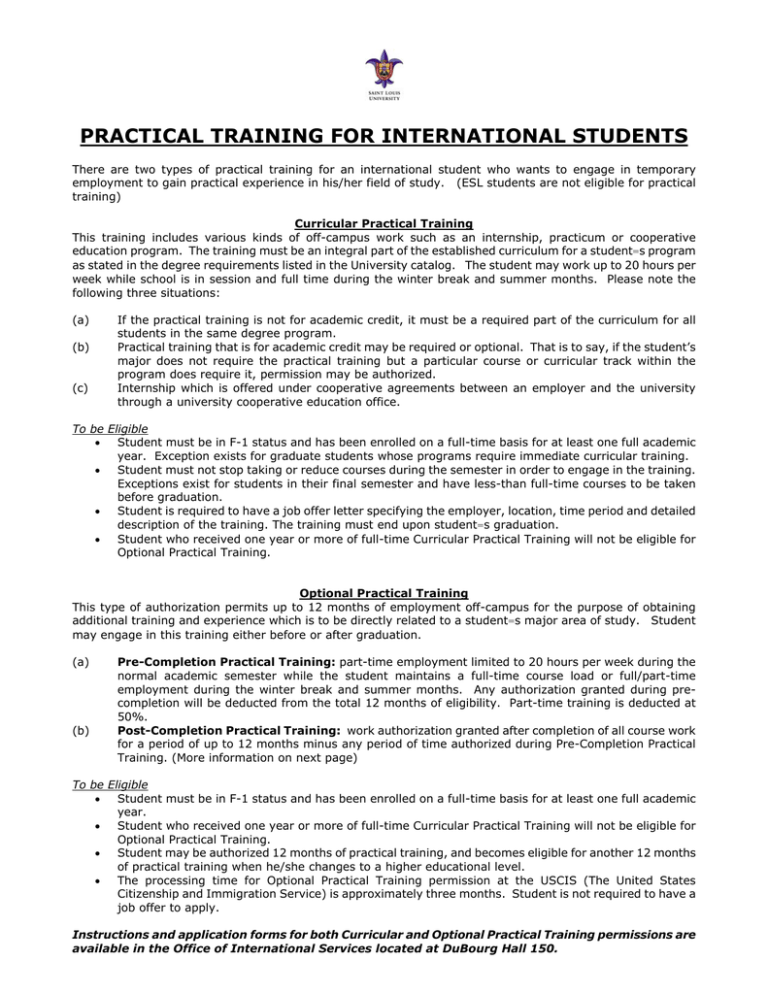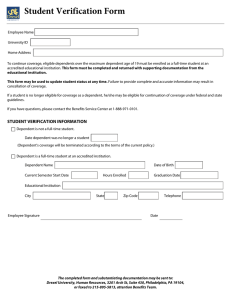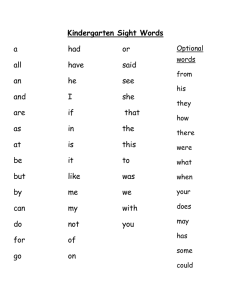PRACTICAL TRAINING FOR INTERNATIONAL STUDENTS
advertisement

PRACTICAL TRAINING FOR INTERNATIONAL STUDENTS There are two types of practical training for an international student who wants to engage in temporary employment to gain practical experience in his/her field of study. (ESL students are not eligible for practical training) Curricular Practical Training This training includes various kinds of off-campus work such as an internship, practicum or cooperative education program. The training must be an integral part of the established curriculum for a student=s program as stated in the degree requirements listed in the University catalog. The student may work up to 20 hours per week while school is in session and full time during the winter break and summer months. Please note the following three situations: (a) (b) (c) If the practical training is not for academic credit, it must be a required part of the curriculum for all students in the same degree program. Practical training that is for academic credit may be required or optional. That is to say, if the student’s major does not require the practical training but a particular course or curricular track within the program does require it, permission may be authorized. Internship which is offered under cooperative agreements between an employer and the university through a university cooperative education office. To be Eligible • Student must be in F-1 status and has been enrolled on a full-time basis for at least one full academic year. Exception exists for graduate students whose programs require immediate curricular training. • Student must not stop taking or reduce courses during the semester in order to engage in the training. Exceptions exist for students in their final semester and have less-than full-time courses to be taken before graduation. • Student is required to have a job offer letter specifying the employer, location, time period and detailed description of the training. The training must end upon student=s graduation. • Student who received one year or more of full-time Curricular Practical Training will not be eligible for Optional Practical Training. Optional Practical Training This type of authorization permits up to 12 months of employment off-campus for the purpose of obtaining additional training and experience which is to be directly related to a student=s major area of study. Student may engage in this training either before or after graduation. (a) (b) Pre-Completion Practical Training: part-time employment limited to 20 hours per week during the normal academic semester while the student maintains a full-time course load or full/part-time employment during the winter break and summer months. Any authorization granted during precompletion will be deducted from the total 12 months of eligibility. Part-time training is deducted at 50%. Post-Completion Practical Training: work authorization granted after completion of all course work for a period of up to 12 months minus any period of time authorized during Pre-Completion Practical Training. (More information on next page) To be Eligible • Student must be in F-1 status and has been enrolled on a full-time basis for at least one full academic year. • Student who received one year or more of full-time Curricular Practical Training will not be eligible for Optional Practical Training. • Student may be authorized 12 months of practical training, and becomes eligible for another 12 months of practical training when he/she changes to a higher educational level. • The processing time for Optional Practical Training permission at the USCIS (The United States Citizenship and Immigration Service) is approximately three months. Student is not required to have a job offer to apply. Instructions and application forms for both Curricular and Optional Practical Training permissions are available in the Office of International Services located at DuBourg Hall 150. F-1 POST-COMPLETION OPTIONAL PRACTICAL TRAINING TO BE ELIGIBLE: You must have been studying full time for at least one full academic year to begin your Optional Practical Training (OPT). However, if this is your first year of studies in the U.S., you may submit your application up to 90 days prior to completing one full academic year. You must be in an F-1 status at the time of application. Application must be made before the completion of your degree program. TO APPLY: You must complete the application and obtain an EAD (Employment Authorization Document) before leaving the U.S. for vacation. The Office of International Services will not receive the EAD and forward it to your overseas address. Submit the following documents to the Office of International Services, located in DuBourg Hall 150: 1) A letter of recommendation from your academic advisor. 2) Properly filled “OPT Application Request Form” and “Reporting Requirement After Receiving the EAD” form with signature and date. 3) Copy of your SEVIS I-20 (Page 1 & 3), I-94 (both sides) and passport page (or pages) showing photo, passport number, issuing country and expiration date. 4) Properly filled Form I-765. 5) Two color photographs as specified in the enclosed guidelines. 6 ) An application fee of $180 in check payable to USCIS (a money order or bank draft is recommended and may expedite the process). Apply as early as possible: It will take approximately 90 days to process the paperwork at the USCIS office. If you have not received a decision within 90 days, you may obtain interim work authorization. Please contact our office for details. Job offer not required: You are not required to have a job offer to apply for the EAD. However, you cannot begin an employment before the completion of your studies even if you have received your EAD. 12 months for each degree program: You are allowed to apply for the practical training for a maximum of 12 months, minus the number of months (if any) you used for the Pre-Completion Optional Practical Training. You are eligible for another 12 months of practical training when you change to a higher educational level. After receiving your EAD: You are required by the immigration regulations to notify our office any name change, address change or discontinuation of your employment for the duration of your practical training.


